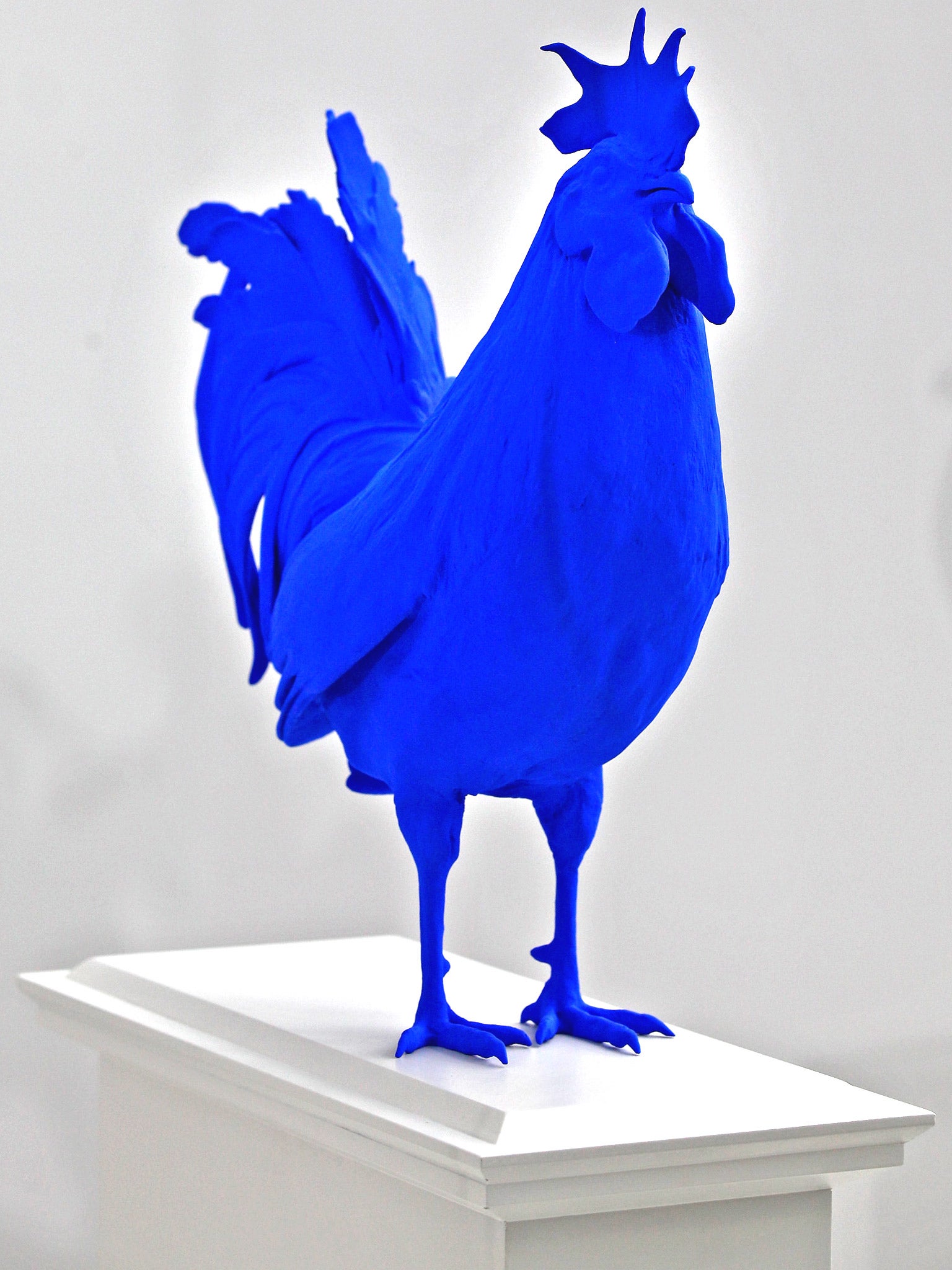Controversy and a cock-up on Trafalgar Square's Fourth Plinth
Positioning a blue cockerel next to Admiral Lord Nelson in London landmark seen as ‘inappropriate’

Your support helps us to tell the story
From reproductive rights to climate change to Big Tech, The Independent is on the ground when the story is developing. Whether it's investigating the financials of Elon Musk's pro-Trump PAC or producing our latest documentary, 'The A Word', which shines a light on the American women fighting for reproductive rights, we know how important it is to parse out the facts from the messaging.
At such a critical moment in US history, we need reporters on the ground. Your donation allows us to keep sending journalists to speak to both sides of the story.
The Independent is trusted by Americans across the entire political spectrum. And unlike many other quality news outlets, we choose not to lock Americans out of our reporting and analysis with paywalls. We believe quality journalism should be available to everyone, paid for by those who can afford it.
Your support makes all the difference.Plans to install a giant blue cockerel in Trafalgar Square are being opposed by a conservation group headed by one of the country’s most senior judges.
The 14ft fibreglass bird designed by the German artist Katharina Fritsch is due to take pride of place on the fourth plinth on 20 July.
Westminster City Council officers have recommended that the plans be approved at a meeting on Tuesday next week, but campaigners have claimed the artwork is “totally inappropriate” for the central London site.
The Thorney Island Society, which counts the recently appointed Lord Justice of Appeal Sir Nicholas Underhill as its president, said, in a letter to the Council, that the electric blue sculpture was unsuitable for the plinth. The cock is a national symbol of France, and the artwork will be stared down by Admiral Lord Nelson, who led the British to victory over the French Navy at the Battle of Trafalgar in 1805.
The society’s chairman, Jane Stubbs, wrote: “We cannot see any logical reason for the proposed sculpture to be placed on the fourth plinth. It is unrelated to the context of Trafalgar Square and adds nothing to it but a feeble distraction.
“The only tenuous argument put forward is the artist’s dubious claim that the ‘cockerel is a symbol for regeneration, awakening and strength’. More to the point is that the artist boasts it is seen as ‘a rude interruption to the grey formal architecture of the square’. This is neither a happy nor pleasing criterion for the use of this most significant location.”
Among the society’s patrons are Labour politician Lord Hattersley and musician Jools Holland, while Tory MP Alan Duncan is its vice president.
But in a statement to the council, Ms Fritsch risked provoking the society further by saying her work “mischievously” situates the national symbol of France “within a square that celebrates an historical victory over the French”. She claimed her work “diminishes its surroundings” and would be a “species interloper” in an area known for its “endless flocks of pigeons”.
The application noted the society’s concerns, but said that any perceived harm to the appearance of the conservation area would be “offset by the public interest that will result from the contribution the sculpture will make to public art in Westminster.”
Matthew Slotover, the co-director of the Frieze Art Fair and a member of the Fourth Plinth Commissioning Group, said one of art’s crucial functions was to provoke.
“If you want a sculpture that looks like something that was made 500 years ago it’s not going to be an interesting sculpture – it’d be a very historically unimportant artist who does that,” he said. “Katharina Fritsch is one of the major German artists of the past 30 years. She did an amazing show at the Tate, and we should be honoured to have her doing a major piece in London.”
This isn’t the first time the Society has expressed its distaste for plans involving Trafalgar Square. The London 2012 countdown clock was apparently “over-elaborate, fussy and detrimental to its purpose”, and needed to be “of a design which discourages climbing and abuse”.
They did, however, enjoy the statue of a boy on his rocking horse by Elmgreen & Dragset which was unveiled last year. It was, they said, “welcome as a reminder of a different expression of human kind, especially at a time when there is so much violence in the world.”
Pillar talk: Previous displays
Ecce Homo
After standing unoccupied for 150 years, the plinth played host to Mark Wallinger’s life-sized sculpture of Jesus Christ in 1999. The artist said it was designed to “stand in contrast to the overgrown relics of empire”.
Alison Lapper Pregnant
Marc Quinn’s marble sculpture of Alison Lapper, an artist who was born without arms and has shortened legs, divided critics in 2005. Robert Simon, editor of the British Art Journal, said: “I think it is horrible.” The Disability Rights Commission disagreed, saying it was “powerful and arresting”.
One and Other
In 2009, Antony Gormley gave 2,400 people the chance to stand on top of the plinth. Several of the chosen volunteers courted controversy by stripping naked, but the last participant – Emma Burns – gave a touching tribute to the 96 victims of the Hillsborough tragedy.
Nelson’s Ship in a Bottle
Yinka Shonibare’s scaled-down replica of HMS Victory won praise when it was placed atop the plinth in 2010. The Turner Prize nominee said it was a “celebration of London’s immense ethnic wealth.”
Join our commenting forum
Join thought-provoking conversations, follow other Independent readers and see their replies
Comments